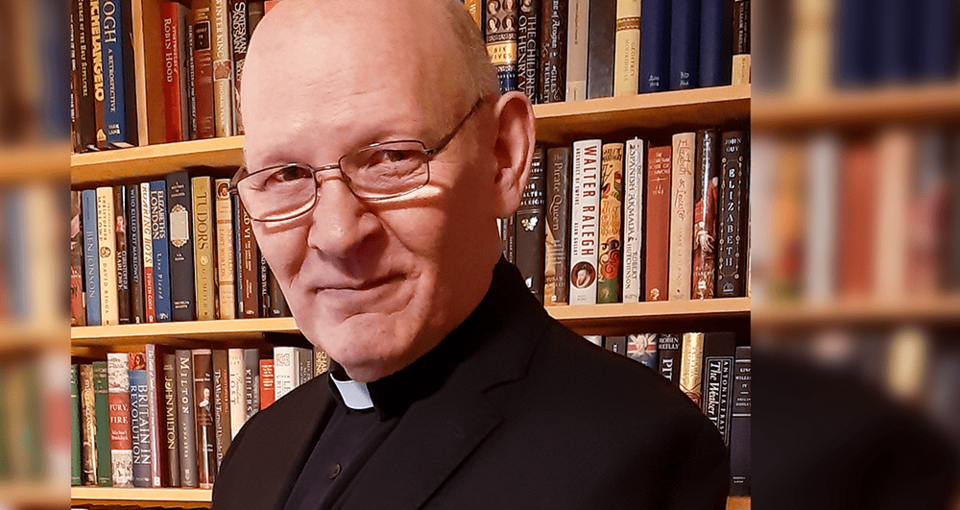I don’t usually write book reviews in this space but in this case I simply couldn’t resist. Because “Our Daily Bread, From Argos to the Altar – A Priest’s Story” by Alex Frost, a Church of England priest, is a quite wonderful and essential volume. I should explain immediately, by the way, that Argos is a British store where people buy all sorts of items from a catalogue. It’s relatively cheap, and a constant of British life.
Alex Frost is probably best known, in Canada as well as the United Kingdom, for his excellent series of podcast interviews with various religious, political, and cultural figures. The appeal of those conversations — and the online competition is vast of course — is based largely around the fact that unlike some in the trade, Frost understands the importance of listening. And it’s that gift of listening, in this case to people of his beloved hometown and parish of Burnley, in the northwest of England, that makes this book so compelling.
Part autobiography, part anecdote, part reflection, Frost recounts his life from soccer referee, Argos store manager, and stand-up comic to a priest in an often desperately poor inner-city parish in Lancashire. Not a typical preparation perhaps but the experience is vital. He was punched unconscious as a ref, and threatened with death as a shop manager. They don’t teach that in seminary, at least not in the one that I attended!
The book gives us stories of poverty, prostitution, housing and hospital waiting lists, addiction, violence, mental illness, self-harm, crime, shattered families, and, in a nation as wealthy as Britain, genuine hunger. All of this inevitably magnified by the pandemic, lockdown, and economic and social consequences.
Yet while Frost is understandably and righteously angry at it all, he is never “self-righteously” nasty or blaming. That’s a rare and, I’d suggest, poignantly Christian response. When he speaks of being “inclusive” he actually means it. He’s not party political, he emphasizes, he just wants people to know and to do something. Frost lives that out every day, and it’s something we can learn from here in Canada, where love should always be more powerful than hate.
The book is also genuinely funny, because people facing cement-like hardship often use humour as an escape mechanism. My Jewish taxi-driving dad used to tell the best Jewish jokes one could hear. Because they were good jokes, because they were ironic, but largely because they provided release. Frost, for example, on his Christian formation: “It made gentle introductions, it left subtle deposits, just as my puppy does sometimes.” I rather like that. Religious is serious but that doesn’t mean that religious people should be humourless. God forbid, as it were.
At heart and soul this is an account of street theology, which is by no means supposed to be a criticism. The daily living of the deepest teachings of the Christian Gospels applied to people in conditions of brokenness and challenge, the like of which many of us would consider foreign or of “the other.” And such an approach should never, must never, be confined to Christianity. If we’re going to deal properly with racism, poverty, climate change, and injustice we have to find new and different responses.
What we often refer to as the “other” was propelled into British homes when the BBC aired an award-winning documentary entitled “The Cost of Covid: A Year on the Front Line.” Frost was one of the featured clerics, and millions watched, and were shocked, at what they saw. This, surely, was the stuff of drama or foreign reporting rather than local news? But it wasn’t. The same applies to Canada, where misunderstanding of the daily life for the poor is steadily increasing.
Not so for Alex Frost, who seems now not to be shocked by very much. But that certainly doesn’t mean he’s complacent. Far from it. He emphasizes that change and solidarity are essential.
This book and its message will remain with me for, I hope, a very long time indeed. There are rough and tough times ahead, and we need to engage with and listen to people who have firsthand experience of the real world, the frontlines, and all this involves.
One point, however. Frost is a diehard fan of Burnley soccer club, and no matter what he says or does he’ll never convert me. Tottenham Hotspur born-and-bred, and nothing’s going to change that! I’m so glad I read this book, and so glad Alex Frost wrote it.



